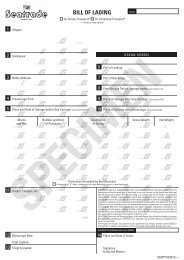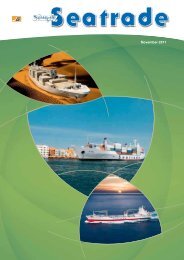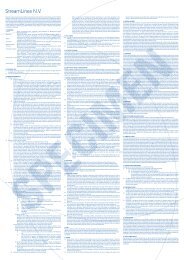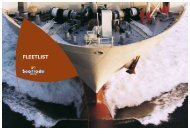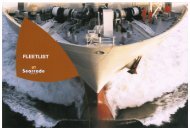Create successful ePaper yourself
Turn your PDF publications into a flip-book with our unique Google optimized e-Paper software.
46<br />
leading For saFeTy<br />
Safer lives, safer ships, cleaner seas<br />
The Maritime and Coastguard Agency (MCA) issued a guide that<br />
is intended to help leaders and senior officers in the maritime<br />
industry improve their leadership and people management<br />
skills in order to ensure safe operations. The guide contains tips<br />
and best practices for ten core leadership qualities for effective<br />
safety leadership, split into five categories.<br />
Why do I need it?<br />
There is well-established research both in the maritime and<br />
other hazardous industries that confirms the huge impact of<br />
leadership on the safety of operations. Whilst the International<br />
Safety Management (ISM) code has been a major step forward<br />
in improving safety standards, its effectiveness depends heavily<br />
on how leaders approach its implementation, and this in turn<br />
depends heavily on the skills and qualities of leaders - both at<br />
sea, at the ship-shore interface, and on-shore.<br />
Virtually all maritime leaders want to do their best for safety,<br />
this is not in doubt. But sometimes real life makes things<br />
difficult; time pressures, economic constraints and everyday<br />
circumstances sometimes seem to conspire against good safety<br />
leadership. The guide is based not<br />
just on theory but also<br />
on real life, including<br />
consultation with over<br />
65 seafarers and shore<br />
managers about everyday<br />
Simply <strong>Seatrade</strong> <strong>November</strong> <strong>2010</strong><br />
safety leadership challenges. It shows that some of it is common<br />
sense, but nearly everyone can benefit from a reminder.<br />
The 10 Core Safety Leadership Qualities<br />
1. Instil respect and command authority<br />
2. Lead the team by example<br />
3. Draw on knowledge and experience<br />
4. Remain calm in a crisis<br />
5. Practise ‘tough empathy’<br />
6. Be sensitive to different cultures<br />
7. Recognise the crew’s limitations<br />
8. Motivate and create a sense of community<br />
9 . Place the safety of crew and passengers above everything<br />
10. Communicate and listen clearly<br />
In the next issue of Simply <strong>Seatrade</strong> we will cover each of<br />
these in detail, why they are important and dos and don’ts to<br />
accomplish them.<br />
Kor Wormmeester<br />
<strong>Seatrade</strong> - Triton




